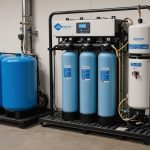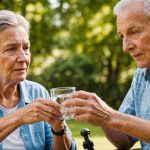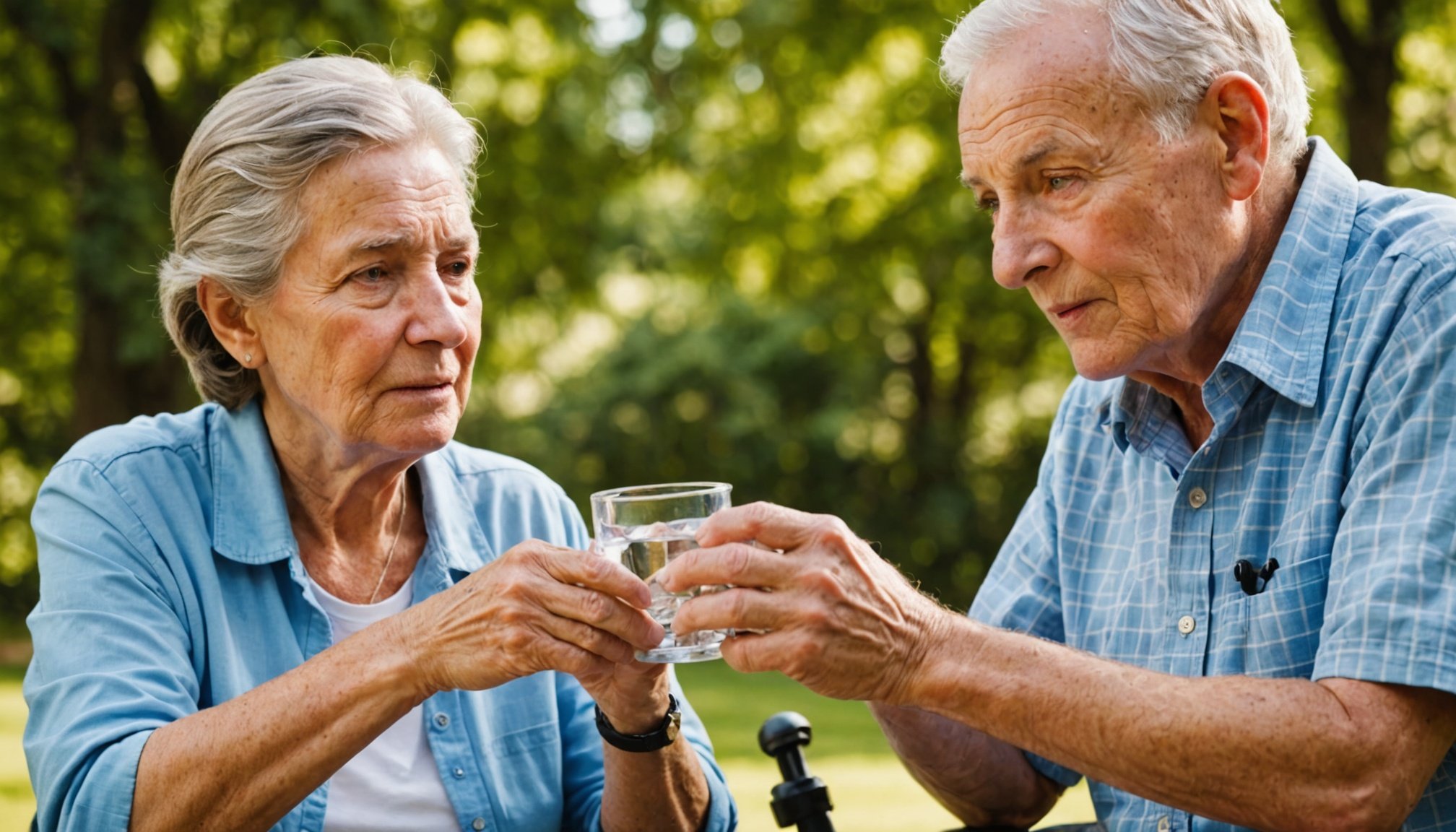Recognizing Dehydration in Seniors: Key Symptoms and Effective Prevention Strategies
Dehydration is a critical health concern that affects people of all ages, but it is particularly perilous for older adults. As we age, our bodies undergo a series of changes that make us more susceptible to dehydration. In this article, we will delve into the key symptoms of dehydration in seniors, the factors that contribute to this condition, and most importantly, the effective strategies to prevent and manage dehydration.
Understanding Dehydration in Older Adults
Dehydration occurs when the body loses more fluids than it takes in, disrupting the delicate balance of water and electrolytes necessary for proper bodily functions. For older adults, this imbalance can be particularly dangerous due to age-related physiological changes.
In parallel : Essential Financial Aid Programs for UK Seniors Seeking Home Modifications for Accessibility
“Dehydration is a critical concern, particularly amongst the senior population. Understanding the importance of hydration for seniors and recognizing the associated risks and complications is essential for maintaining optimal health and well-being,” notes an article from Wellington Estates.
Signs and Symptoms of Dehydration
Recognizing the signs of dehydration is crucial for timely intervention and prevention of further complications. Here are some common symptoms to look out for:
Also to see : Empowering Seniors: Discover Innovative Gadgets to Support Limited Hand Strength
Mild Dehydration
- Thirst: Although older adults may not always feel thirsty due to a diminished sense of thirst.
- Dry Mouth: A lack of saliva can indicate low fluid levels.
- Dark Yellow Urine: Clear urine is a sign of good hydration, while dark yellow urine suggests dehydration.
- Decreased Urine Output: If an older adult is urinating less frequently than usual.
- Headaches: Dehydration can cause headaches due to the lack of fluids.
- Lethargy: Feeling unusually tired or weak.
- Dizziness: A feeling of lightheadedness or dizziness when standing up.
Moderate Dehydration
- Weakness: Generalized weakness or fatigue.
- Muscle Cramps: Cramps can occur due to electrolyte imbalances.
- Constipation: Low fluid intake can lead to constipation.
- Sunken Eyes: Eyes may appear sunken due to fluid loss.
- Low Blood Pressure: Dehydration can cause a drop in blood pressure.
Severe Dehydration
- Extreme Thirst: Though older adults might not always feel thirsty, severe dehydration can cause intense thirst.
- Very Dry Skin: Skin may feel dry and lack elasticity.
- Confusion: Dehydration can lead to cognitive impairment and confusion.
- Little to No Urination: A significant reduction in urine output.
- Delirium or Unconsciousness: In severe cases, dehydration can lead to delirium or even unconsciousness.
Factors Contributing to Dehydration in Seniors
Several factors make older adults more vulnerable to dehydration:
Diminished Sense of Thirst
- As people age, the body’s natural mechanism of thirst regulation diminishes, making it challenging for seniors to recognize when they need water.
Medications
- Certain medications such as diuretics, antihistamines, blood pressure medications, and antipsychotics can increase urination and fluid loss.
Health Conditions
- Conditions like diabetes, which cause increased urination, and gastrointestinal issues such as diarrhea and vomiting, can lead to significant fluid loss.
Mobility Issues
- Limited mobility can make it difficult for seniors to access water or other hydrating fluids.
Lifestyle Factors
- Hot weather, physical activity, and certain dietary habits can also contribute to dehydration.
Diagnostic Approaches
Diagnosing dehydration in seniors often involves a series of tests to assess the extent of dehydration and guide appropriate treatment:
Physical Examination
- Checking for signs such as dry mouth, sunken eyes, and low blood pressure.
Laboratory Tests
- Blood tests to check electrolyte levels and kidney function.
- Urine tests to evaluate the concentration of urine and detect any underlying infections.
Medical History
- Reviewing the patient’s medical history to identify any contributing health conditions or medications.
Effective Prevention Strategies
Preventing dehydration in older adults requires a multifaceted approach:
Encourage Regular Fluid Intake
- Seniors should be encouraged to drink water, milk, and juice regularly. Aim for approximately two liters of fluid intake per day.
Monitor Hydration Status
- Caregivers and healthcare providers should closely monitor the hydration status of seniors, especially those in assisted living facilities. Checking the color of urine is a simple yet effective way to assess hydration levels.
Use Hydrating Foods and Drinks
- Incorporate foods and drinks with high water content, such as soups, fruits, and milkshakes, into the diet. These can help meet both hydration and nutritional needs.
Adjust for Physical Activity and Weather
- Increase fluid intake during hot weather or when engaging in physical activity to compensate for increased fluid loss.
Medication Management
- Work with healthcare providers to manage medications that may affect fluid balance. For example, adjusting diuretic dosages or switching to alternative medications if possible.
Practical Tips for Caregivers and Seniors
Here are some practical tips to help maintain adequate hydration levels in seniors:
- Create a Hydration Schedule: Encourage seniors to drink fluids at regular intervals throughout the day.
- Make Fluids Accessible: Ensure that water and other hydrating fluids are easily accessible to reduce the effort required to stay hydrated.
- Monitor Urine Output: Check the color and frequency of urine output to gauge hydration levels.
- Incorporate Hydrating Foods: Add foods with high water content to meals and snacks.
- Avoid Dehydrating Beverages: Limit the consumption of caffeinated and sugary drinks that can exacerbate dehydration.
Table: Comparing Symptoms of Dehydration in Older Adults
| Symptom | Mild Dehydration | Moderate Dehydration | Severe Dehydration |
|---|---|---|---|
| Thirst | May not feel thirsty | Increased thirst | Extreme thirst |
| Urine | Dark yellow | Dark yellow or amber | Very dark or no urination |
| Mouth | Dry mouth | Dry mouth | Very dry mouth |
| Energy | Lethargy | Weakness | Extreme weakness |
| Cognitive | Normal | Confusion | Delirium or unconsciousness |
| Skin | Normal | Sunken eyes | Very dry skin |
| Blood Pressure | Normal | Low blood pressure | Very low blood pressure |
Quotes and Insights from Experts
“Dehydration is dangerous for everyone, but it’s especially dangerous for the elderly population. As our health begins to need some additional support with age, a level of dehydration that might cause a headache for a younger adult might cause memory impairment, cognitive dysfunction, or serious physiological issues for an aged care resident,” highlights an article from Cater Care.
A systematic review published in the Archives of Gerontology and Geriatrics emphasizes the importance of hydration in older people, stating, “Dehydration in older people: A systematic review of the effects of dehydration on health outcomes, healthcare costs and cognitive performance”.
Dehydration in older adults is a serious health concern that requires proactive monitoring and intervention. By understanding the signs and symptoms of dehydration, identifying the contributing factors, and implementing effective prevention strategies, we can significantly improve the health and well-being of seniors.
As caregivers and healthcare providers, it is our responsibility to ensure that older adults maintain adequate hydration levels. This involves creating a supportive environment that encourages regular fluid intake, monitoring hydration status closely, and adjusting for any health conditions or medications that may affect fluid balance.
By working together, we can help older adults lead full, healthy lives, free from the risks associated with dehydration. Remember, staying hydrated is not just about drinking water; it’s about maintaining the delicate balance of fluids and electrolytes that our bodies need to function optimally.











